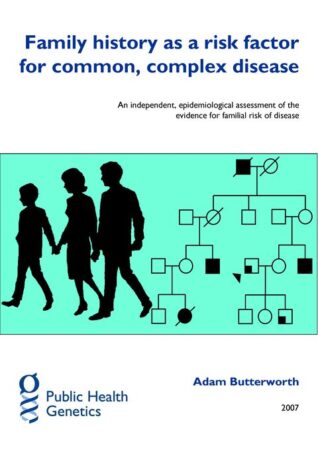Home Publications Reports Family history as a risk factor for common, complex disease
Family history as a risk factor for common, complex disease
This report, produced by the Public Health Genetics Unit (now the PHG Foundation), is the result of an independent, epidemiological project designed to investigate the risks associated with having a family history of a number of common diseases. The project was funded by the Association of British Insurers (ABI) and its members as an investigation of the evidence base for the use of family history for insurance purposes in light of the current moratorium on the use of genetic test results.
Using comprehensive systematic reviews, meta-analysis and life-table methodology, this piece of work shows how individual absolute risks can be accurately estimated where the evidence is abundant and population incidence data are available (e.g. for most common cancers). For other diseases, such as stroke and multiple sclerosis, where there have been fewer studies or population data are not available, it is harder to accurately assess familial risk. These methods show that family history is an important risk factor for complex disease, particularly for those with multiple affected relatives. The risk estimates may be useful in both clinical and insurance contexts when trying to assess an individual’s future risk of disease.
We hope to update our absolute risk estimates in the near future to incorporate the most recent population data and produce sex-specific risk curves.
By Adam Butterworth, Paul Pharoah

